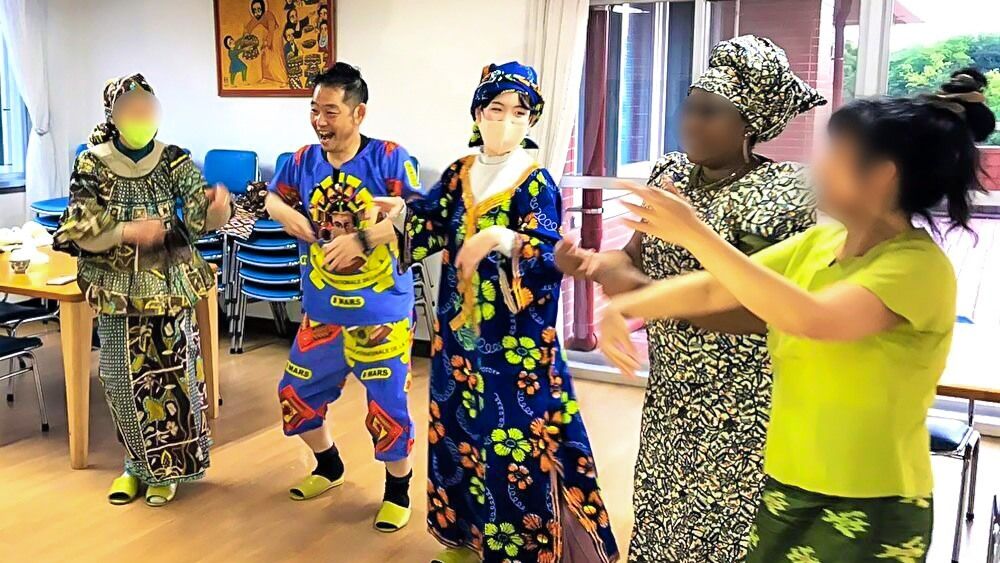
Oikawa Izumi: Japanese University Student on the Front Lines of Refugee Aid in Japan
Society World Work Lifestyle- English
- 日本語
- 简体字
- 繁體字
- Français
- Español
- العربية
- Русский
Supporting Refugees in Japan
Tucked among the temples and shrines in the ancient capital of Kamakura in Kanagawa Prefecture is the Arrupe Refugee Center. Established as an NPO in 2020, the facility, which is able to accommodate up to 30 individuals, occupies an old Jesuit retreat house surrounded by trees and other greenery.
Worldwide, more than 100 million people have fled their homes to escape armed conflict and persecution, both religious and political. Many seek shelter in neighboring countries, while others hope to find protection in advanced nations. There is a tendency for Japanese to see this flood of refugees as a far-off problem, but each year hundreds of asylum seekers find their way to Japan’s shores.
Those who come to Japan, though, face dim prospects of having their petitions granted. While Western countries have opened their borders to large numbers of displaced persons, Japan, which signed the UN Refugee Convention in 1981, lags far behind other signatory nations in accepting refugees, recognizing only a fraction of asylum claims it receives.
People who are initially refused refugee status are typically granted provisional release as they appeal their applications. However, without the legal right to reside in Japan, theirs is a precarious existence. They are unable to seek work, cannot access health insurance and welfare services, and face the constant fear of long-term incarceration or even deportation. Prevented from looking after their most basic needs, many are forced to live on the streets. Their plight has garnered broad attention in Japan and overseas, with the Japanese government coming under fire for its inhumane immigration policies.
Facilities like the Arrupe Refugee Center play a vital part in supporting the lives of asylum seekers in Japan. Since opening, it has taken in 31 refugees from 16 different countries. In April of this year, it accepted its newest residents, a Ukrainian couple who fled the war in their country. Among the volunteers supporting the needs of those living at the center, including helping take their minds of their precarious situation, is Kamakura native Oikawa Izumi.
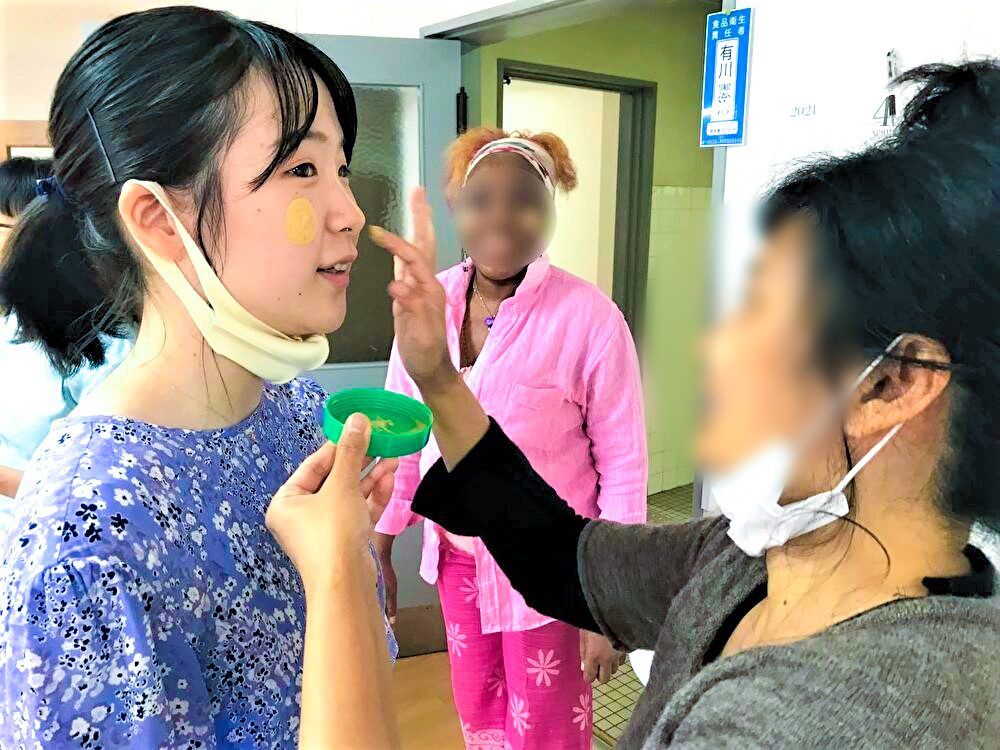
A resident applies thanaka, a type of skin lotion used in Myanmar, to Oikawa’s face.
Oikawa entered Sophia University in 2018 with the ambition of someday working overseas assisting people in need. Keen to get real world experience, she made plans to volunteer at the 2020 Tokyo Olympics and take part in a project to teach Japanese in Indonesia.
Shortly after she started her studies, though, the arrival of the COVID-19 pandemic forced her to put her dreams on hold. “I was ready to step out into the world, only to find that I couldn’t leave my home,” Oikawa says. Her hopes of volunteering at the Olympics dissipated when the games were postponed and the opportunity to travel to Indonesia with an aid group fell through when global coronavirus cases skyrocketed.
Rather than give up, Oikawa turned her attention to local volunteer work. She heard about the newly opened Arrupe Refugee Center from acquaintance Urushibara Hiroshi, who heads the NGO Japan Lay Missionary Movement. Oikawa looks up to Urushibara, whose passion for aid work has taken him around Japan and the world. “He makes a lot of sacrifices in his life, but he derives so much satisfaction from helping people in need,” she declares. “It’s something I aspire to.”
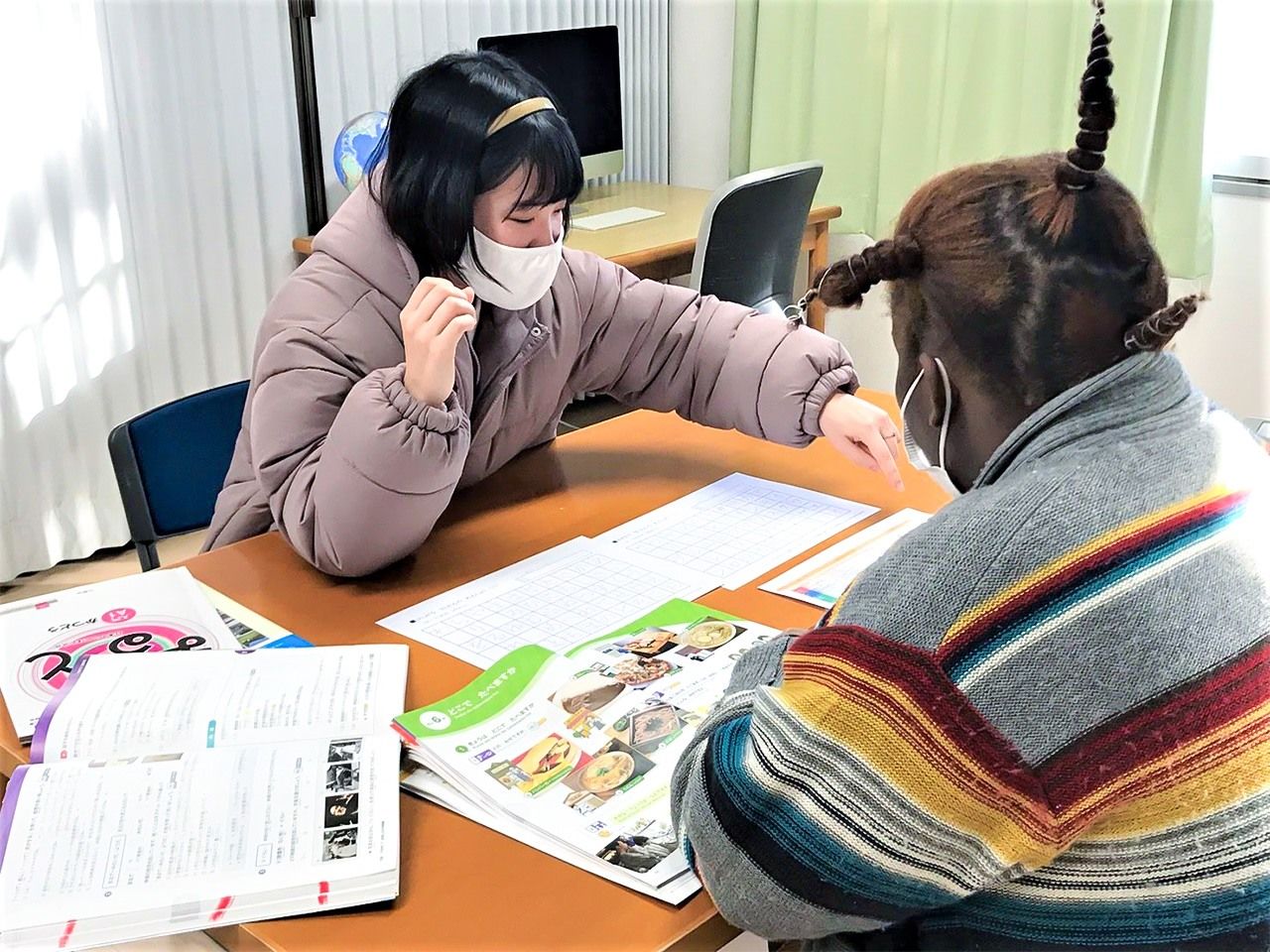
Oikawa on her first day at the refugee center teaches Japanese to a resident from Africa. She was introduced to the shelter by NGO head Urushibara Hiroshi, who helped guide the facility through the difficult funding application process.
Returning Smiles to Faces
The trauma residents of the facility have endured in their home countries and their precarious status in Japan take a heavy toll on their emotional wellbeing. Oikawa notes that many prefer to hole up inside their rooms rather than interact with others at the center. Oikawa has put on events, including making chirashizushi and Japanese-style curry and planning trips outside the facility to a nearby zoo and tourist spot Enoshima, with the aim of giving residents a brief respite from their concerns. “Anything I can do to help brighten their lives.”
Oikawa says that she is given free rein to plan new activities. “An older facility would have a number of set programs, but Arrupe allows volunteers to come up with their own events,” she explains. “It’s been a great opportunity to learn and build vital skills.”
Along with planning and running activities, Oikawa draws attention to the center’s aid work on social media and gives presentations at seminars, including an online event held on June 20, 2021, in honor of World Refugee Day.
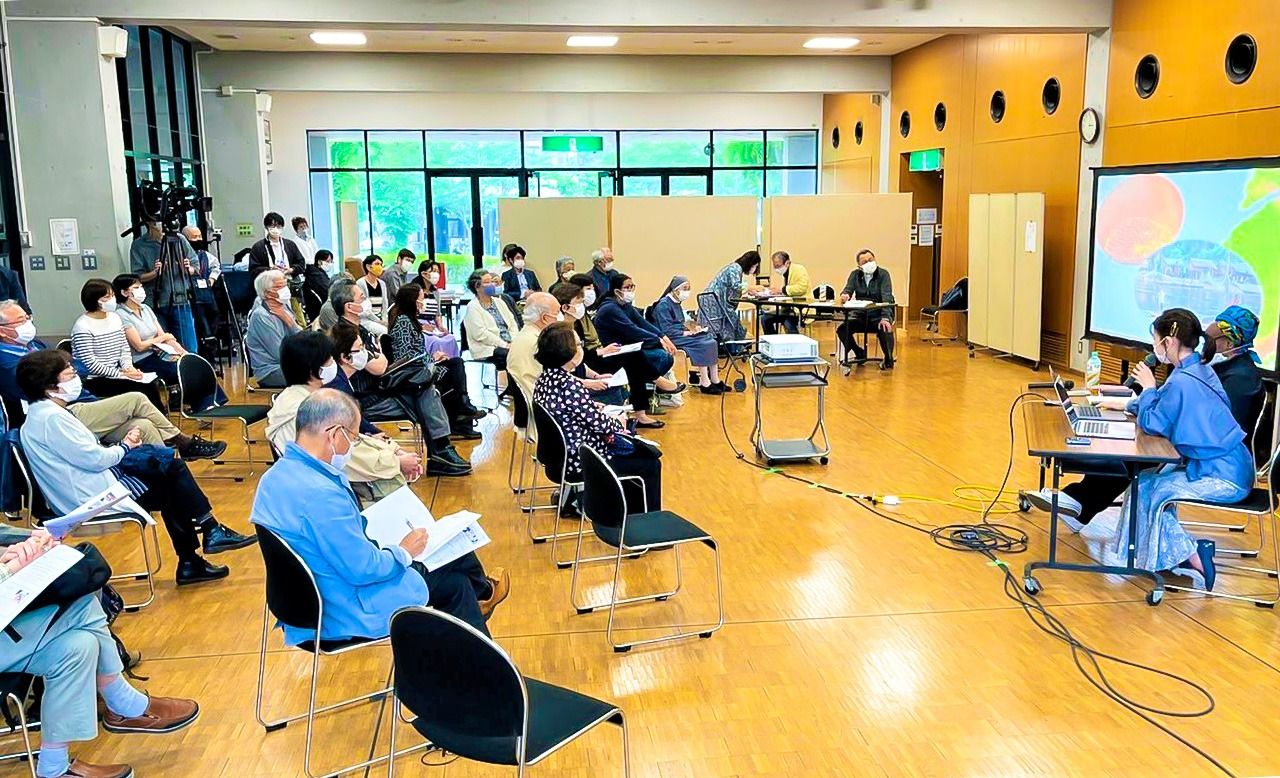
Oikawa, right, speaks at a seminar about her other work at Arrupe.
Her main focus, though, is helping with the various day-to-day needs of the people at the shelter. She has started to study to get her nursing care license and is often charged with looking after residents who fall ill. However, she can also be found patiently explaining how to use a smartphone, and she always has time for the two children living at the center.
Oikawa says she has had to learn how to deal with tense moments, which are not uncommon considering what residents at the shelter are enduring. Misunderstanding can lead to terse words or other actions, with Oikawa’s youth making her an easy target. During strained moments, she focuses on understanding the person’s situation rather than allowing her emotions to get the best of her.
Making a Difference in Refugees’ Lives
Oikawa recalls having regular run-ins with one resident of the shelter from Africa. “She was quick to praise other staff but was very critical of me,” she recounts. “She would often ignore me when I spoke to her. It was very stressful.”
The situation shifted 180 degrees, though, when Oikawa began caring for the five-year-old daughter of another resident who was in the hospital after giving birth to her second child. Oikawa says the child was a handful. “The mother didn’t discipline the girl much.” Reading the situation, the woman who Oikawa had issues with took it upon herself to lay down some rules, and after a stern talking-to, the girl became easier to handle. It helped that the woman and mother were from the same country. “The woman confided in me later that part of her behavior toward me stemmed from the stress of seeing the girl run amuck. Knowing this changed my view of her and we got along great after that.”
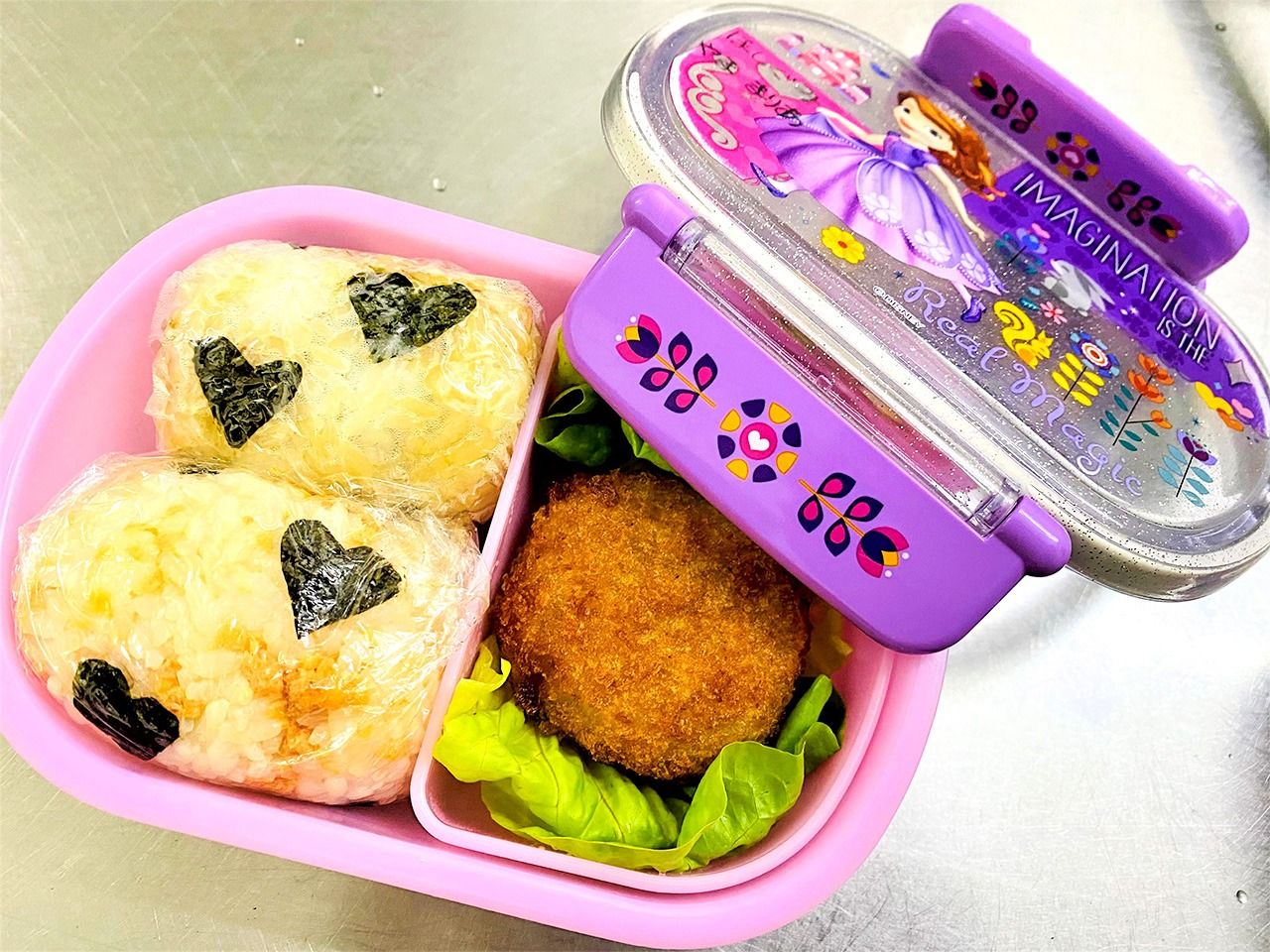
Oikawa looked after the young daughter of a resident for 10 days straight while the mother was in the hospital, including making the girl’s bentō.

Oikawa plays with the daughter of a resident at the Arrupe Refugee Center.
Providing Aid Where Needed Most
After a two-year wait, Oikawa in late 2021 was finally able to travel to Indonesia as part of a project to teach Japanese in the country. To her surprise, she quickly adjusted to the different culture and surroundings, something she attributes to her experience at the Arrupe Refugee Center. “It’s been like experiencing the world in my own backyard,” she declares. “I’ve been able to build basic skills that will serve me in my career.”
Her time at the shelter has given her something more, though: an understanding of the plight of refugees. She admits that while she may be able to cheer up residents for a while, she has no way of changing their fundamental situation. “People seeking refugee status ask me things like how they can go about finding work to provide for their family, but there’s nothing I can do for them. Japan’s legal system doesn’t allow it, which falls back on me as a citizen.” She says that along with providing aid, it is vital to campaign for change to Japan’s immigration system to make it so that asylum seekers in the country are able to live freely.”
Oikawa, now in her fifth year of university, has a position lined up at an international aid organization starting from next spring. The global refugee crisis is only set to worsen amid a rise in armed conflict and other strife in regions around the world. Now more than ever, young volunteers like Oikawa are needed on the front lines of aid efforts.
(Originally published in Japanese. Banner photo: Arrupe Refugee Center volunteer Oikawa Izumi, center, wears traditional Congolese clothing and performs a dance from Myanmar with residents during an event at the shelter. All photos courtesy of Oikawa Izumi. Some photos have been altered to protect the identity of individuals.)